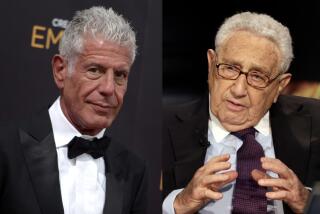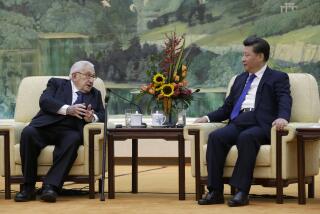Modernization in China
- Share via
Henry A. Kissinger’s article (Opinion, Jan. 19), “China Tries World’s Newest Model--an Upheaval That Is In America’s Interest,” gave me mixed feelings.
As an American-Chinese newspaperman who had strong ties with China, I would like to share the author’s upbeat view on the outlook of the modernization program that is being launched. I, however, differ with him on whether at this time we can conclude that the “upheaval is in America’s interest.”
Kissinger’s main argument is “the modernization of China serves American interests because in maintaining its own security for its own purposes, China contributes to the global equilibrium.”
My belief is that if two nations, like two individuals, have not established deep friendship and respect for each other, what one does for the other always tends to be superficial, self-serving and cross-purposed. Take a lesson from World War II. History has proven Franklin D. Roosevelt’s “generosity” did not make a friend out of Josef Stalin or his successors. Instead, the Soviet Union, saved from a near-crushing defeat and strengthened by massive American aid, turned out to be the No. 1 nightmare of the United States.
Now we have the case of huge U.S. bank loans to some Latin American countries. Many of the perhaps badly planned, though well-intentioned, loans are on the verge of default today. The eventual loss to the American taxpayers will be tremendous.
Times have changed. There is no more free lunch. Uncle Sam cannot expect to earn world respect by playing Santa Claus this way.
Peking has not been supporting the United States in the latter’s stand on anti-nuclear, anti-terrorist and other vital international issues.
As to Kissinger’s observation of China’s role as a counterweight in world geopolitics, this is a position that the People’s Republic of China and its leaders will have to choose for its own survival and viability with or without outside aid. There is little the United States can do to change the picture one way or another.
What the United States can do is to win better support from China in world affairs and to inspire more economic reforms and liberalized human rights for the people on the Chinese mainland. Only through this give-and-take, down-to-earth approach can we forestall another flop in our global aid responsibility.
STANWAY CHENG
Los Angeles
More to Read
Sign up for Essential California
The most important California stories and recommendations in your inbox every morning.
You may occasionally receive promotional content from the Los Angeles Times.










